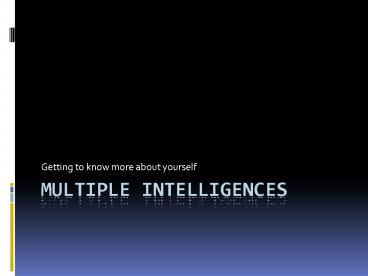Multiple Intelligences - PowerPoint PPT Presentation
1 / 11
Title:
Multiple Intelligences
Description:
Schools used to teach to ONLY the logical, and articulate members of the classroom. Gardner's theory proposed that people are smart in different ways. ... – PowerPoint PPT presentation
Number of Views:49
Avg rating:3.0/5.0
Title: Multiple Intelligences
1
Multiple Intelligences
- Getting to know more about yourself
2
Theory
- Howard Gardner developed the theory in 1983.
- Our society used to only understand intelligence
in terms of I.Q., Gardner argued that this was
far too limited. - Schools used to teach to ONLY the logical, and
articulate members of the classroom. - Gardners theory proposed that people are smart
in different ways. - This means that schools should look to educate
all students in different ways (e.g. art projects
in science, scientific method in social studies,
etc.) so that all students can demonstrate their
learning. - There are currently nine recognized
intelligences, we will look at the eight most
accepted, however.
3
Intrapersonal Intelligence
- Intelligences and Interests
- Manages emotions
- Motivates self
- Identifies and pursues interests
- Sets goals
- Organizes resources
- Introspective and reflective
- Listens to self
- Comfortable with
- Thinking about and evaluating self.
- Expressing individuality within a group.
- Identifying own strengths and areas of growth.
- Appreciates
- Own individuality.
- Having personal space.
- Working alone.
4
Interpersonal Intelligence
- Intelligences and Interests
- Listens to others
- Collaborates
- Shares
- Organizes
- Shows leadership
- Mediates conflict
- Shares credit and blame
- Empathizes
- Salesmanship
- Modesty
- Humility
- Respect
- Comfortable with
- Identifying and resolving conflicts
- Helping others to be successful so the group can
succeed - Appreciates individuality of others
- Appreciates working in groups
5
Linguistic Intelligence
- Comfortable with
- Learning new words or languages.
- Discussing ideas
- Appreciates
- Thinking in words and using language to express
ideas. - Oral communication (i.e. persuading others,
describing events, etc.)
- Intelligences and Interests
- Likes to talk
- Question asking
- Good at memorizing phrases, sayings, quotes, etc.
- Have a strong vocabulary
- Can pick up new languages easily
6
Musical Intelligence
- Intelligences and Interests
- Singing, humming, and whistling
- Remembering melodies and lyrics
- Patterns
- Rhythm
- Harmony
- Imitating sounds
- Comfortable with
- Listening to music
- Expressing oneself through music
- Organizing sounds
- Appreciates
- Elements of pitch, rhythm, timbre, and music
composition - Musical performance
7
Visual-Spatial Intelligence
- Reading
- Maps
- Charts
- Drawing
- Puzzles
- Visualization
- Imagining objects
- Playing chess
Intelligences and Interests
- Comfortable with
- Drawing, painting, sculpting, designing, building
and creating, daydreaming, looking at pictures,
and composing photos. - Organizing and rearranging objects.
- Appreciates
- Elements and principles of design and composition
- 2-D and 3-D visual representation, pictures, and
colors, works of art
8
Bodily-Kinesthetic Intelligence
- Comfortable with
- Moving around, touching things, using body
language - Processing knowledge through body sensations
- Appreciates athletic and/or artistic expression
and physical process or producing body movements.
- Intelligences and Interests
- Athletics
- Dancing
- Acting
- Crafts
- Using tools
9
Logical-Mathematical Intelligence
- Comfortable with
- Making sense of numerical information from
tables, charts, and graphs - Asking questions
- Attacking challenging problems
- Appreciates
- Numerical patterns and relationships
- Precise calculations and estimates
- Thinking things through logically.
- Intelligences and Interests
- Calculating
- Problem finding and solving
- Deductive and inductive reasoning
- Charts and graphs
- Sequencing
- Puzzles
- Patterns
10
Naturalist Intelligence
- Intelligences and Interests
- Observing
- Describing
- Collecting
- Experimenting
- Seeking
- Discovering
- Modeling complex phenomena
- Comfortable with
- Using binoculars, telescopes, microscopes, etc.
- Methods for organizing observations
- Looking for relationships between plants,
animals, insects, and their habitat - Appreciates
- Being in nature
- Observing and noting behavior of plants, animals,
birds, reptiles, and insects - Observing stars, planets, constellations, and
galaxies.
11
Whats next?!
- Now, you will be working through a series of
worksheets that are meant to help you figure out
which of the multiple intelligences best fit you.
Good luck discovering yourself!































